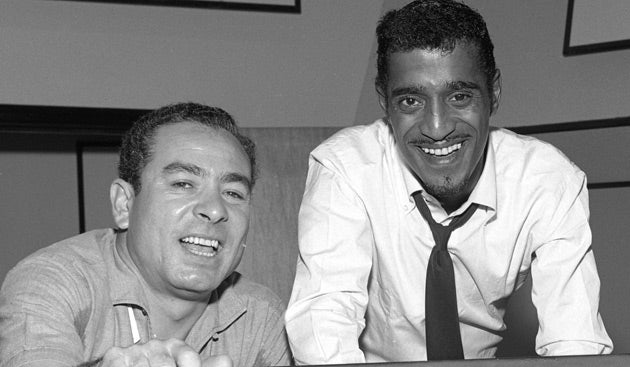Sam Butera: Saxophonist and entertainer who found fame as Louis Prima's 'Big Horn'

Your support helps us to tell the story
From reproductive rights to climate change to Big Tech, The Independent is on the ground when the story is developing. Whether it's investigating the financials of Elon Musk's pro-Trump PAC or producing our latest documentary, 'The A Word', which shines a light on the American women fighting for reproductive rights, we know how important it is to parse out the facts from the messaging.
At such a critical moment in US history, we need reporters on the ground. Your donation allows us to keep sending journalists to speak to both sides of the story.
The Independent is trusted by Americans across the entire political spectrum. And unlike many other quality news outlets, we choose not to lock Americans out of our reporting and analysis with paywalls. We believe quality journalism should be available to everyone, paid for by those who can afford it.
Your support makes all the difference.The Las Vegas entertainer, Louis Prima referred to Sam Butera as "The Big Horn". For 20 years, the tenor saxophonist led the Witnesses, who accompanied Prima and his wives, Keely Smith and Gia Maione, and wrote most of the arrangements. After Prima's death in 1978, he continued as a lounge act, often working with Smith.
Sam Butera was born into an Italian family in New Orleans in 1927. His father, Joe, was a butcher who played the guitar and concertina for pleasure. He introduced his son to big band music and bought him a clarinet and then a saxophone. From the age of 14, Butera was accompanying strippers in local clubs. Butera worked with Ray McKinley and Paul Gayten's bands and then formed his own band. At the age of 18, he was cited as a promising teenage musician in Look magazine, which led to an appearance at Carnegie Hall.
Butera married his high school sweetheart, Vera, in 1947 and they remained married until he died, raising four children. During their first years, he had a long residency at a New Orleans club and he was heard by Leon Prima, who recommended him to his brother, Louis.
By 1954, Louis Prima was in a double act with his fourth wife, Keely Smith, and part of their humour was based on the disparity in their ages. Prima was desperate to break into the lounge entertainment now provided by the Las Vegas casinos. When he secured a residency at the Sahara, he needed a small band. He asked Butera to join him and on their opening night, Prima introduced him and the other musicians as "Sam Butera and the Witnesses." They became a permanent feature, playing five shows a night.
Butera was an inventive musician, writing new arrangements for Prima's existing material as well as adding material. He enjoyed putting unlikely songs together such as the famed combination of "Just A Gigolo" and "I Ain't Got Nobody". Prima liked to give standards a swing and clown around with the lyrics, often adding Italian scat. Most Prima records include a sax break from Butera, and the two men have a jive talking conversation on "There'll Be No Next Time" (1957), which is the equal of any record by the Coasters. They had a US hit with "That Old Black Magic" and a UK one with "Buona Sera", both in 1958, but it was mainly on albums that they excelled such as The Wildest! (1957), and they were recorded live in Las Vegas and Lake Tahoe. They are featured in the films, Hey Boy! Hey Girl! (1959) and Twist All Night (1961), and one of Butera's tracks, "Bim Bam" later became a favourite with UK rock'n'rollers.
By 1961, Prima was becoming uncontrollable: drinking, gambling and womanising to excess. Smith said she could have tolerated one fault but not all three, and left. Prima told her he would continue with a new singer called Kelly Smith, but his girlfriend appeared under her own name, Gia Maione. Unfortunately, she was not as talented as Smith, but the band continued its success. There is a superb version of "St Louis Blues" on The Wildest Comes Home (1962). Prima and Butera were monkeying around on "I Wan'na Be Like You" for The Jungle Book (1967).
Butera appeared as a con man as well as scoring the film The Rat Race (1960) with Tony Curtis and Debbie Reynolds. He made the solo album, The Whole World Loves Italians (1966), recorded When The Feeling Hits You with Sammy Davis Jr (1965) and played a solo on Frank Sinatra's version of Neil Diamond's "Stargazer" (1976). Sinatra introduces him by saying, "Jump on it, Sam; get all over that thing."
Prima fell into a coma in 1975 and died three years later. Prevented by Maione from calling his band the Witnesses, Butera formed the Wildest and created his own lounge act including Prima's successes, but with more straight jazz. He was singing as much as playing and he often worked with Keely Smith. His closing words were "It's nice to be important but it's more important to be nice" and he and his musicians would move around the patrons, shaking hands and playing "When The Saints Go Marching In".
Butera was unimpressed when David Lee Roth from Van Halen revived "Just A Gigolo / I Ain't Got Nobody" (1985), complaining that Roth had stolen his arrangement without permission or payment. The Brian Setzer Orchestra won a Grammy for their recording of "Jump, Jive An' Wail" (1999), which is also in the repertoire of Bill Wyman's Rhythm Kings.
Spencer Leigh
Sam Butera, saxophonist: born New Orleans 17 August 1927; married (two sons, two daughters); died Las Vegas 3 June 2009.
Join our commenting forum
Join thought-provoking conversations, follow other Independent readers and see their replies
Comments